Get Into Your Sanctuary Workshop for youth
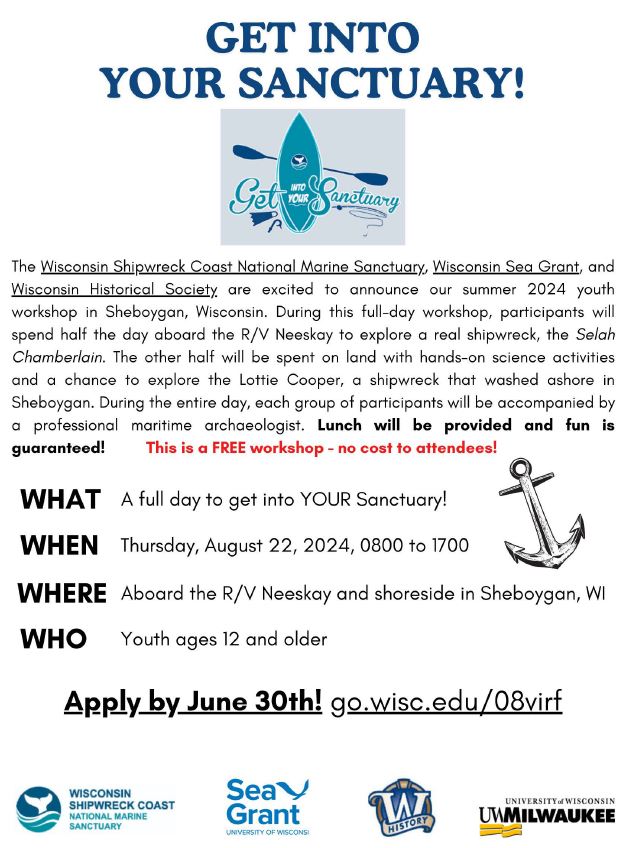
Blog | Wisconsin Sea Grant
https://www.seagrant.wisc.edu/blog/get-into-your-sanctuary-workshop-for-youth/

Blog | Wisconsin Sea Grant
https://www.seagrant.wisc.edu/blog/get-into-your-sanctuary-workshop-for-youth/
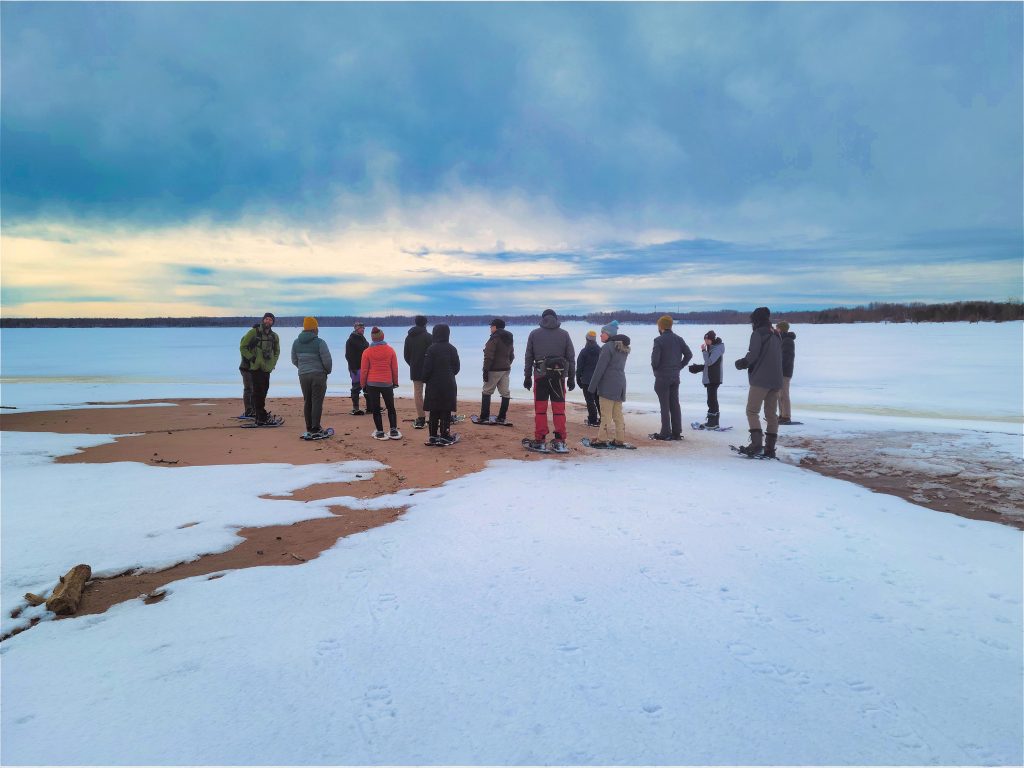
Field trip participants with the St. Louis River Summit learn about efforts to encourage piping plovers to nest on Wisconsin Point. Image credit: Marie Zhuikov, Wisconsin Sea Grant
I participated in a field trip during the recent St. Louis River Summit that involved snowshoeing out to a bird sanctuary on Wisconsin Point, which is near Superior, Wisconsin. The sanctuary is a protected area on a sandy spit of land, specifically designated for endangered shorebirds called piping plovers (Charadrius melodus).
I enjoy any opportunity to visit Wisconsin Point, but I also attended because I was involved in early habitat restoration efforts for these cute little birds before I worked for Wisconsin Sea Grant. I was interested in hearing the latest intel about their status.
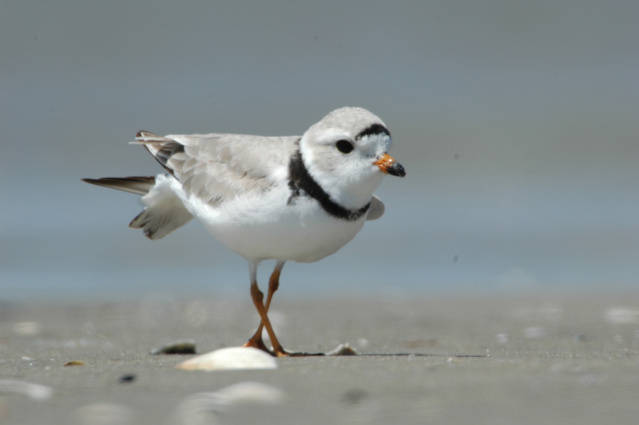
A piping plover. Image credit: U.S. Fish and Wildlife Service
The St. Louis River Estuary had breeding plover pairs up until 1989. The last nesting pair was seen at this bird sanctuary site. Plovers, which look like killdeers, prefer large isolated beaches for nesting. Much of this habitat type has been lost due to development and recreational pressure. Work to increase the population of plovers is going on all across the Great Lakes and in other parts of the country.
Matt Steiger, St. Louis River Area of Concern Coordinator with the Wisconsin Department of Natural Resources (DNR), led the field trip along with David Grandmaison, St. Louis River wild rice and habitat restoration coordinator with the Wisconsin DNR.
As we snowshoed out to the end of the beach in a cold wind from the northeast, Steiger explained that several projects had taken place on the site over the years to make it attractive to plovers and common terns. The latest was begun with Great Lakes Restoration Initiative funding in 2019, which involved enlarging the beach with clean dredged sand. The goal was to create habitat that would last despite changing water levels in the harbor and storms and would require minimal maintenance. Fourteen acres of nesting and foraging habitat were created along with three “nesting pans” composed of small cobblestones that plovers prefer.
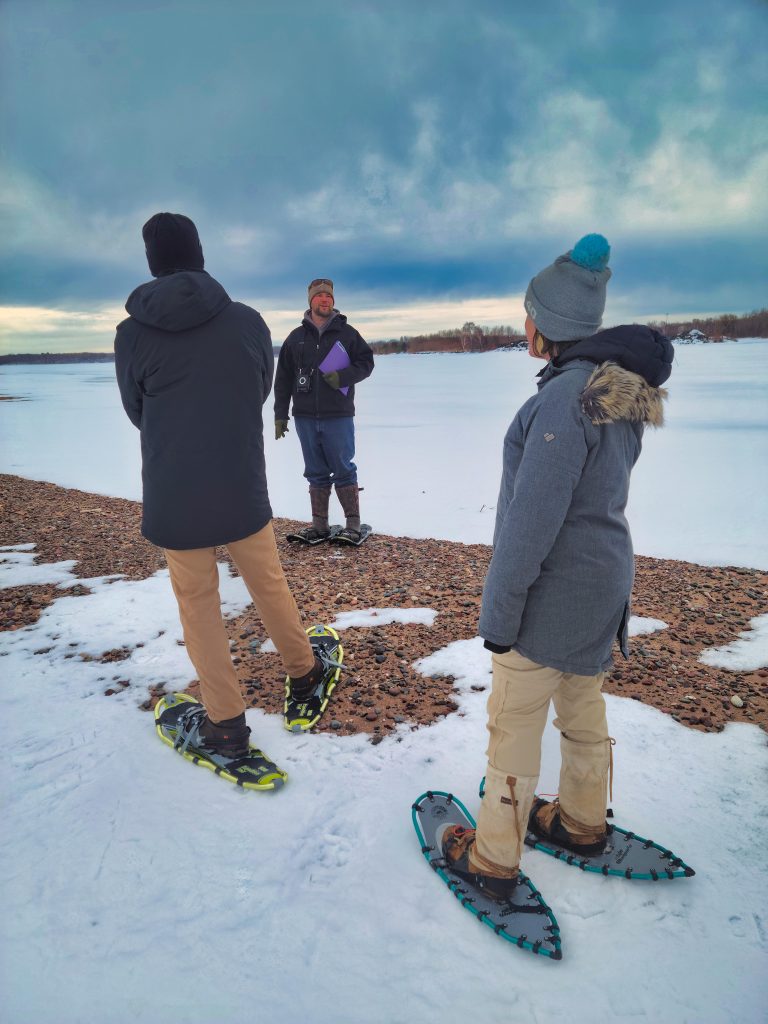
Matt Steiger, WI DNR, (center) discusses the Wisconsin Point Bird Sanctuary restoration efforts to field trip participants. Image credit: Marie Zhuikov, Wisconsin Sea Grant
Piping plover monitors coordinated by the St. Louis River Alliance have kept their eyes peeled for any plovers on this site and others around the estuary. So far, none have nested, but sometimes these efforts take time – decades, even. Steiger said that a female plover was spotted in the sanctuary during the spring 2022 migration season at the same time a male was spotted on nearby Minnesota Point. Let’s hope that someday two plovers will land on the same beach at the same time!
In other areas of the state, Wisconsin Sea Grant has played an integral role in habitat restoration that benefits piping plovers. Our staff were involved in the Cat Island Restoration Project in Green Bay, which created 1,400 acres of barrier islands in Lake Michigan that had previously disappeared due to high lake levels and storms. In 2016, for the first time in 75 years, endangered piping plovers successfully nested on a restored island there and fledged chicks.
Sea Grant was also involved in an earlier effort on Wisconsin Point’s Shaefer Beach to create plover habitat. We were involved in initial design discussions for the bird sanctuary work but are not currently participating. For more information, see this cool post and videos on the Perfect Duluth Day website.
At the end of the tour, Grandmaison described work going on in nearby Allouez Bay to restore wild rice beds. Historically, wild rice was abundant in Allouez bay and throughout the estuary, providing an important food source for Native Americans. Wild rice beds also provided habitat and food for birds and wildlife. Their abundance in the estuary declined significantly in the past century, and today only a sparse remnant stand exists in Allouez Bay. Wild rice seeds were spread throughout the bay. Exclosure fencing was installed protect the seedlings from browsing pressure of Canada geese.
As I snowshoed back to my car, I remained hopeful that someday, Wisconsin Point will be home to nesting piping plovers and lush stands of wild rice, thanks to these efforts.
The post Restoring piping plover habitat on Wisconsin Point first appeared on Wisconsin Sea Grant.Blog | Wisconsin Sea Grant
https://www.seagrant.wisc.edu/blog/restoring-piping-plover-habitat-on-wisconsin-point/?utm_source=rss&utm_medium=rss&utm_campaign=restoring-piping-plover-habitat-on-wisconsin-point
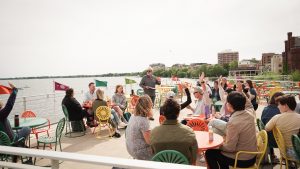
Based on the success of a pilot program on the University of Wisconsin-Madison campus last summer, 31 undergraduate Freshwater@UW Summer Research Scholars opportunities are open for application today.
“The experience over summer definitely cemented my interest in research,” said Manasi Simhan, who was in the 2022 nine-person cohort and participated in a Wisconsin River sediment analysis led by Eric Roden of the UW-Madison Department of Geoscience. “If I had a chance to do it again, I would definitely do it again.”
Like Simhan, summer 2023 undergraduates will be matched with water-related faculty mentors and graduate students to align interests and grow skills applicable to post-graduate studies and future careers. There will be professional development and cross-campus programing, concluding with the chance for students to present results of their individual projects in a group setting.
In-state undergraduate applicants are encouraged to select opportunities that are not on their home campus in an effort to increase collaboration among the eight University of Wisconsin System campuses participating in 2023. Those campuses are Eau Claire, Green Bay, La Crosse, Madison, Manitowoc, Milwaukee, Oshkosh and Superior. Find details and apply at this link: https://water.wisc.edu/wateruw-madison-undergraduate-research-experience The deadline is Feb. 15, 2023.
An additional goal of the program is to create a diverse academic environment by increasing the number of traditionally underserved students in Wisconsin graduate programs, and ultimately, a well-prepared freshwater workforce.
Jim Hurley, director of the University of Wisconsin Water Resources Institute (WRI), said, ““We’ve had great success with the pilot program last year and we’re anxious to greatly expand opportunities statewide so students can work alongside more of the UW System’s outstanding water researchers.”
The program will run from May 31 through Aug. 5, 2023. In terms of remuneration, there is a $6,000 stipend, $600 meal allowance and provision of housing.
The 2023 freshwater science experiences are funded by WRI and its sister organization the Wisconsin Sea Grant College Program, along with resources from the Freshwater Collaborative of Wisconsin.
The Freshwater Collaborative of Wisconsin is a partnership of Wisconsin’s 13 public universities, connecting with industry partners, local communities, policymakers and advocacy groups. Its mission is to establish Wisconsin as a world leader in freshwater science, technology, entrepreneurship and economic growth. The Freshwater Collaborative of Wisconsin is training the next generation of scientists to solve global water resource problems through academic program, collaborative research and career development across the UW System.
The post Freshwater@UW Summer Research Scholars Program opportunities now open first appeared on WRI.News Release | WRI
https://www.wri.wisc.edu/news/freshwateruw-summer-research-scholars-program-opportunities-now-open/?utm_source=rss&utm_medium=rss&utm_campaign=freshwateruw-summer-research-scholars-program-opportunities-now-open
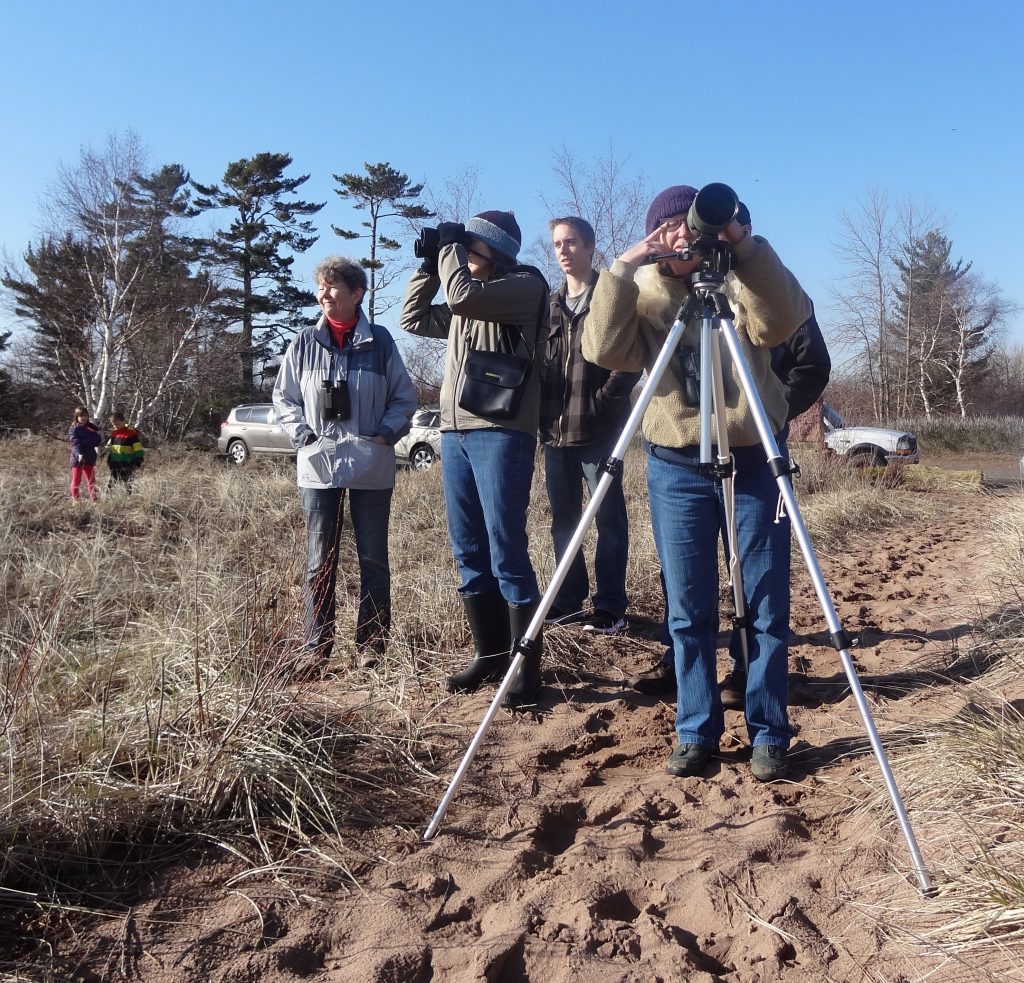
Birders search for birds on Wisconsin Point. Image credit: Marie Zhuikov
Join the Lake Superior National Estuarine Research Reserve from 9-11 a.m., Sept. 21, for a free, bird-focused morning. People of all ages and ability levels are welcome to attend this accessible birding outing led by birding experts from the Hawk Ridge Bird Observatory and the Friends of the Lake Superior Reserve at the Lake Superior Estuarium (3 Marina Drive) on Barker’s Island in Superior.
Move along the boardwalk or paved trails on a guided bird hike or explore bird artifacts like feathers and skulls indoors at your own pace. Fifteen pairs of binoculars will be available, plus a spotting scope, a wheelchair mount for the scope and portable seating.
Light refreshments will be provided. Come and stay for the whole time or part of it.
Registration is not required but is encouraged so that participants can receive email reminders. Register here. (https://lakesuperiornerr.org/event/accessible-bird-observing/)
These activities are designed with access in mind. If you would like to request additional accommodations, please email Luciana.Ranelli@wisc.edu or call Luciana at (715) 399-4085 at least 10 days before the event.
This free event was made possible through the University of Wisconsin–Madison Dean’s Innovation Grant to collaborators from Upham Woods Outdoor Learning Center, the Reserve, Wisconsin Sea Grant, University of Wisconsin Extension, and Bayfield and Ashland counties.
The post Free accessible birding outing first appeared on Wisconsin Sea Grant.News Releases | Wisconsin Sea Grant
News Releases | Wisconsin Sea Grant
https://www.seagrant.wisc.edu/news/free-accessible-birding-outing/?utm_source=rss&utm_medium=rss&utm_campaign=free-accessible-birding-outing
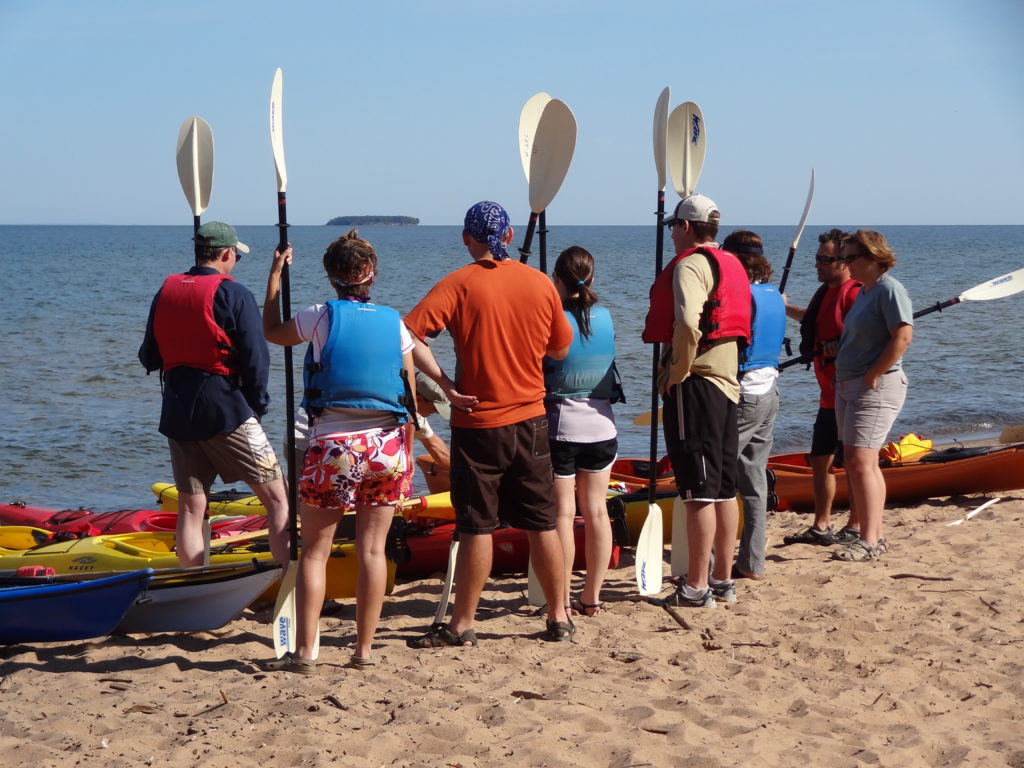
Kayakers receive instructions from their guide before a trip in the Apostle Islands National Lakeshore. Image credit: Marie Zhuikov, Wisconsin Sea Grant
A new international training program for outdoor guides and outfitters is now available online for northwestern Wisconsin. The program, named Guide and Outfitter Recognized Professional (GORP) is being offered by Wisconsin Sea Grant in conjunction with Oregon Sea Grant.
GORP content was developed with input from professional guides, educators and tourism organizations. It’s aligned with best practices recommended by the Adventure Travel Trade Association. With completion of the program, experienced guides and outfitters will be recognized for their existing knowledge and information on a wide range of topics and best practices, demonstrating the value of their guiding services over competitors to potential clients. For aspiring guides, it will provide a great foundation for their future business.
GORP consists of four online modules that participants are encouraged to complete within a month, although there is flexibility. These are augmented by optional live webinars conducted by Oregon Sea Grant Extension staff. The next course begins Monday, Nov. 1, and it is free. Future course offerings will have costs associated with them. Although the course is geared toward northwestern Wisconsin, registration is open to all and may be helpful to guides in other parts of Wisconsin, too.
Course content covers a broad range of knowledge and skills that guides can use to improve client experiences, including identification of 101 local species of plants and animals, knowledge of local history, natural resource agencies, tourism organizations and economic impacts, group management, customer service, sustainability, marketing, personal interpretation skills and more.
Those completing the GORP program will be awarded a certification and a package of marketing benefits including: a GORP branded shirt, GORP logo vinyl for boat or truck, special listing on the GORP website, and other online marketing services.
Development of Wisconsin’s GORP program was led by Natalie Chin, climate and tourism outreach specialist for Wisconsin Sea Grant. For more information or to register, visit the GORP site and choose the Wisconsin program.
The post Outdoor guide online training program offered for free first appeared on Wisconsin Sea Grant.News Releases | Wisconsin Sea Grant
News Releases | Wisconsin Sea Grant
https://www.seagrant.wisc.edu/news/outdoor-guide-online-training-program-offered-for-free/?utm_source=rss&utm_medium=rss&utm_campaign=outdoor-guide-online-training-program-offered-for-free